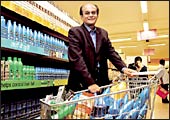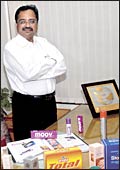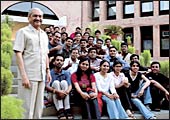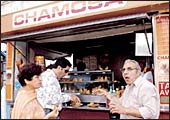|
ITC
We Also Make Cigarettes
 |
| Biscuits, anyone? Deveshwar has quickly
created some top-selling brands in the FMCG market |
| In three years, ITC has attained 45 per
cent share in the branded wheat flour segment. And it took
just two years to garner 8 per cent of the biscuit market |
Imagine getting
into a fragmented and messy market for wheat flour (atta), where
there's no supply chain, no consistency in quality, no brand loyalty,
or even proper packaging. Kolkata-based tobacco giant, ITC, did
just that more than three years ago, and far from get scared,
it plunged right into the market. Result: Its Ashirwad Atta today
boasts of a whopping 45 per cent share in the branded and packaged
wheat flour segment. It did something similar in biscuits, where
it took on two major players (Britannia and Parle) and has garnered
8 per cent of the market in just two years.
Sure, it helps that ITC is a marketing behemoth
that spends a staggering Rs 226 crore on advertising. But that
alone can't explain why ITC has been able to crack the staples
and biscuits markets. "ITC's traditional strengths of brand
building, trade marketing and distribution provide distinctive
sources of competitive advantage in the marketplace-whatever may
be the product or service," says ITC's Chairman, Y.C. Deveshwar.
The company believes, say its executives, that at the heart of
a great brand is a great product. That means investment in product
development. Last year, for instance, ITC spent Rs 54 crore on
research and development of various products. "For any leader
in its field, innovation is a byword for success. ITC's marketing
prowess has been significantly enhanced by a constant flow of
innovations that have become benchmarks in the industry,"
says Kurush Grant, ITC's head of FMCG and tobacco businesses.
Pre-printed vinyls instead of hand-painted hoardings, and planograms
at points of sale are two such innovations.
Aggressive marketing has sent ITC's non-tobacco
FMCG sales soaring. In 2004-05, that part of the business fetched
a relatively modest Rs 564 crore (it's a Rs 16,510-crore company
we are talking about here), but last year the figure almost doubled
to Rs 1,013 crore. Agreed, ITC has some consumer products such
as incense sticks, stationery and even apparel that aren't doing
as well, but it is evident that with each passing year, the company
is looking less and less like the tobacco giant it once was. "At
the fundamental level, we haven't changed," says Grant. "We
still retain our passion for obtaining consumer insights and understanding
consumer behaviour," he says. At the end of the day, marketing
is all about reading the consumer's mind.
-Ritwik Mukherjee
 |
| Numero Uno: But Khattar's MUL has hit
roadblocks in recent months |
| Maruti sold a record 53,396 units in May
this year. But, subsequently, sales dropped because it cut
back on production of two B-segment cars, the Zen and WagonR |
MARUTI UDYOG
Tenacious Leader
Marketing is
about keeping customers happy," deadpans Jagdish Khattar,
Managing Director of Suzuki-owned Maruti Udyog. How seriously
does the small car-maker, which has a 45 per cent share of the
market, believe in the motto? Enough for Khattar to cut his marketing
budget and transfer it over to sales and service. No wonder, Maruti
has been topping J.D. Power's customer satisfaction survey for
six years now. But there are times when even the savvy market
leader trips up. Like in the recent months. Maruti's sales peaked
in May this year at a record 53,396 units, but have declined since.
What went wrong? Production of its B-segment car, Zen, was stopped
a couple of months ago to make room for the new Zen, due for launch
in November. WagonR too went off the assembly lines for a few
weeks as Maruti worked on a facelift. "Withdrawing the Zen
has been one of the most difficult things we have ever done,"
says Khattar, a former IAS officer. "Not only did it make
a 3,000-4,000 unit hole in sales, we should have launched the
replacement model straight away." Needless to say, Khattar
is a wiser man today. "We will not make the same mistakes
next time," he promises. Rivals, take note.
-Kushan Mitra
 |
| Well oiled: Marico's image has been
overhauled by Mariwala |
| Advertising and packaging innovations have
changed Marico's image from a fuddy-duddy one to a modern
brand. Plus, the company has stayed focussed on its key brands |
MARICO
Marketer Of Wellness
Harsh Mariwala
has a name for the strategy he has been employing at Marico ever
since he joined the family business way back in the 70s. He calls
it 'discontinuous growth and the philosophy of wellness'. It was
discontinuous growth when he led a small family-owned business
from (oil) wholesale to retail, it was discontinuous once more
when he dumped (after a seven year-long battle) tin for plastic
as the packaging medium. "The shift to plastics resulted
in huge gains in market share to about 30-40 per cent, from the
pre-plastic days of 10-15 per cent," says Mariwala, Chairman
and MD.
Over the years, Mariwala has kept ploughing
profits back into advertising and packaging innovations to change
the image of the company from a fuddy-duddy one to a modern brand.
And that's how products like Parachute Jasmine and Parachute hair
cream were born. Another thing that Marico has done is to stay
focussed on its key brands and emphasise the wellness quotient.
Saffola, for instance, has retained the "good for heart"
essence of the brand over the years. "It is very tempting
to cross the boundary to extend market size, but it should not
dilute the brand," says Mariwala. Therefore, all brand extensions
(into salt, wheat flour, and three varieties of oil) have kept
the touchstone in mind. "We have always been in the business
of wellness and Kaya is just an extension of that philosophy,"
says Mariwala, referring to Marico's newest diversification into
skin care clinics. It took Mariwala 15 years to hit Rs 1,000 crore
in annual revenues. He expects going from here to Rs 2,000 crore
to take just three years.
-Shivani Lath
PARAS PHARMACEUTICAL
FMCG's Serial Brand Builder
 |
| What's in a name? Patel has made a successful
foray into the FMCG market |
Perhaps it's
time Paras dropped or changed the second part of its name. In
the five years since the Ahmedabad-based company started focussing
on FMCG products, it has amassed an enviable portfolio of brands.
Dermicool (talcum powder), Afterbath (freshness cream), Livon
(hair protection), Set Wet (hair styling gel) are just some of
its well-known FMCG brands. "I think the quality of our distribution
has made us more an FMCG company than a pharmaceuticals company,"
quips Chairman & CEO, Girish Patel, who also believes in advertising
like an FMCG company. In the market for over-the-counter pharma
products, Paras has top-selling brands such as D'Cold, Borosoft,
ItchGuard, Krack, and Moov, to name a few. Evidently, going from
otc to fmcg hasn't been too hard for the family-managed company.
"Our USP lies in having products that are specifically targeted
at the consumer," points out Patel.
 |
| Wide range: Paras has portfolio of small
but well-known brands |
Today, Paras is a Rs 250-crore company with
a Rs 50 crore bottom line, but Patel is thinking big. "By
2011, we want to be a Rs 1,000-crore company," he states.
Raising money to fund the growth won't be a problem for this closely-held
company. It recently sold a 23 per cent stake to private equity
investor Actis (which also owns 41 per cent in Paras-promoted
Sterling Hospitals) for about Rs 200 crore. Paras already has
a manufacturing unit at Kalol, near Ahmedabad, and is building
another one at Baddi in Himachal Pradesh. The logic behind the
new plant is simple: about half of the company's products are
outsourced, and Patel is keen to reduce that percentage. By 2011,
Patel also wants a fifth of his revenues to come from exports
(currently it is 8 per cent). In other words, the show has just
begun at Paras.
-Krishna Gopalan
IIM AHMEDABAD
Simply the Best
 |
| Class apart: Dholakia (standing) and
his school are in the A-league |
| IIM-A has worked consistently to deliver
on the brand promise. It's no wonder that Wall Street firms
and big MNCs make a beeline to recruit from the school |
Its rivals pooh-pooh
its Numero Uno status in the business of management education
("it's only a perception," says the director of a rival
IIM), but that doesn't really bother Bakul Dholakia, the man who
runs India's best-known B-school, IIM Ahmedabad. The numbers speak
for themselves. Out of every 680 candidates who apply for admission
via the gruelling Common Admission Test (CAT), IIM-A admits only
one. Big recruiters who queue up every year to hire from A often
go back empty-handed because bigger Wall Street firms and MNCs
have cleaned out the graduating class.
What's the secret of A's enduring success?
Rama Bijapurkar, a marketing consultant and an IIM-A alumna herself,
says it is the school's focus on the four Ps of marketing. "The
school stands for the best and affordable business education in
the country," she says, pointing out the first two Ps: Product
and pricing.
Dholakia, on his part, says that the brand
perception is not based on nothing. "The custodians of IIM-A
have worked consistently over the years to keep the institute's
brand essence alive and to deliver on the brand promise without
fail," he says. And when you have brand ambassadors (read:
alumni) such as Unilever's M.S. Banga, ICICI Bank's K.V. Kamath,
and management guru C.K. Prahalad, promotion takes care of itself.
-Archna Shukla
 |
| On track: That was just a sneak preview,
says Yadav |
| Yadav took simple steps like reducing the
wagon turnaround time and raising the capacity of goods trains.
His turnaround story has become subject of case studies |
LALU PRASAD YADAV
Mass Marketer
"Remind people that profit is the
difference between revenue and expense. This makes you look smart"
Scott Adams
Chances are,
union railways Minister Lalu Prasad Yadav, India's newest 'management
guru', may never have heard of Scott Adams, the legendary creator
of the Dilbert comic strips. But ask him how he made the Indian
Railways, a Rs 55,000-crore behemoth tottering at the brink when
he took over in May 2004, into a money- spinner (it had a fund
balance of Rs 11,000 crore in 2005-06), and Lalu, revelling in
his trademark rusticity, espouses, "Dekho railway bhi to
ek dhanda hai, to bas dhande ke jaisa chalaayaa, aur kya."
("See, the railways is just another business, and we ran
it like one. That's all.") Yadav has managed to market the
turnaround story so well that it's now the subject of management
case studies at some top B-schools, including IIM-A and Paris'
HEC School of Management. Yadav is scheduled to speak at IIM-A
on September 18 over the finer points of the turnaround.
So, just how did the turnaround happen? Simple.
Yadav asked for an increase in throughputs and a reduction in
costs. Simple steps such as reducing the wagon turnaround time
from seven to five days and raising the capacity of goods trains
from 3,200 tonnes to 4,000 tonnes have resulted in an improvement
of 25 per cent in the total carrying capacity. Moreover, the diesel
price hike of Rs 12 per litre proved favourable for the railways,
as diesel accounts for just 8 per cent of the railways' transportation
costs, compared to 60 per cent for trucks. "The need of the
hour was to redefine ourselves as just a carrier of people and
goods," says Sudhir Kumar, an Officer on Special Duty in
the Rail Ministry, and a Lalu confidante. "The new business
environment offered no room for complacency."
Lalu claims he'll have a fund balance of
Rs 20,000 crore this fiscal. Rail Bhawan mandarins have even more
ambitious plans: a Rs 3,00,000 crore target for the 11th Plan-a
five-fold increase over the 10th Plan. Also, reports indicate
that retail major Pantaloon may soon form a joint venture to develop
some prime railway properties into retail destinations. "Abhi
to aap ne trailer hi dekha hai," says the 'turnaround man',
"film to abhi shuru bhi nahin hui hai." ("All that
you have seen so far is the trailer. The film hasn't even begun.").
We'll be watching, for sure.
-Aman Malik
ICICI BANK
One-stop Financial Shop
 |
| Reflecting success: Kamath's bank has
the largest retail banking portfolio of Rs 1,00,000 crore |
| ICICI Bank is today the market leader in
every product segment, be it auto loans or personal loans.
And the key to its marketing strategy has been smart cross-selling |
Would India's
retail banking have been the same without ICICI Bank? Perhaps
not. The Mumbai-based development-institution-turned-bank was
probably the first domestic banker to spot a retail boom as well
as tap customers before others could sense an opportunity. The
results tell the rest of the story: ICICI Bank enjoys a 40 per
cent market share in auto loans, 31 per cent in home loans, 28
per cent in personal loans and 29 per cent in credit cards-that
makes it the market leader in every product segment. ICICI's story
is also the story of a marketer who learnt how to cross-sell well.
"We follow a marketing mantra of presenting an identical
image across all our products," says Chanda Kochhar, Deputy
Managing Director, ICICI Bank.
Few will disagree that the K.V. Kamath-led
bank today is the most aggressive marketer, with the largest retail
banking portfolio of Rs 1,00,000 crore. And the marketing philosophy
is not so much to sell just another loan product, as to deepen
the relationship with customers and, in turn, save on marketing
costs. Today, such an approach brings a fee income for the bank
that shows in the 55 per cent jump in its fee-based income-up
from Rs 2,098 crore in 2004-05 to Rs 3,259 crore in 2005-06. "Cross-selling
has been one of the very important themes in our marketing strategy,"
says Kochhar, adding that, "cross-selling originates from
the fact that the bank has the largest customer base and an array
of products to offer."
ICICI was the first to introduce innovative
marketing schemes like pre-approved loans for its 6 million 'good'
borrowers out of a total 17 million. "We also tapped customers
by discovering their latent needs. We are quick to tap a customer
for a personal loan if a card customer crosses overdraft limit,"
says V. Vaidyanathan, ICICI's retail head. Similarly, a young
auto loan customer is tapped for a home loan product once he or
she is close to repaying the auto loan. "We have seen a success
rate of 10 per cent in such initiatives," reveals Vaidyanathan.
From urban India, ICICI's Kamath is taking
banking into the heart of rural markets. Shunning high-cost brick-n-mortar
marketing, Kamath plans to employ franchisees and kiosks to sell
banking products to rich farmers and rural middle-class. By 2008,
he wants ICICI to cover 600,000 villages in 600 districts. Small-town
India, get ready to say hello to ICICI.
-Anand Adhikari
 |
| Let the good times roll: Mallya's gamble
in the face of low-cost carriers has paid off |
| All its planes are new and it pampers its
customers with gourmet meals and in-flight entertainment.
In less than two years, Kingfisher has cornered 8 per cent
of the market |
KINGFISHER AIRLINES
Flying Against The Low-fare Wind
Trust Vijay
Mallya, the flamboyant Chairman of UB Group and Kingfisher Airlines,
to make a contrarian bet. About 15 months ago when he launched
Kingfisher Airline as a 'true value carrier' and positioned it
between a low-cost (Air Deccan) and full-service carriers (Jet
Airways and Indian), there were sceptics who predicted that it
would fall between the two stools. Neither here nor there.
While Kingfisher, with 16 aircraft and 102
flights per day, has some way to go before it can be hailed as
a complete success, Mallya can rightfully claim that his decision
to pamper customers with good service and care was a considered
one. His airline has cornered more than 8 per cent of the market
in less than two years. "We felt that the discerning Indian
consumer would pay the right price for good service, and that
is the reason why we call ourselves a true value carrier,"
says Hitesh Patel, Executive Vice President, Kingfisher.
From gourmet meals-featuring six different
vegetarian and non-vegetarian options, apart from low-sugar, low-fat
and Jain meals-to in-flight entertainment, Kingfisher has tried
hard to differentiate itself from its competitors. It is not just
meals and entertainment, but Kingfisher says it is the first private
carrier to have advanced airborne communications addressing and
reporting system that continuously monitors and tracks every aircraft,
even when it is in flight. Also, all the planes are new, resulting
in greater technical reliability, claims the airline. Girish Shah,
Head (Marketing), Kingfisher, asserts that sec A and sec B+ consumers
in the age group of 22-45 years are the airline's target. "We
never aimed at low-cost carrier audience. We created a new niche
for ourselves," he says.
However, the airline has had to make a few
adjustments to meet the requirements of the customer. At the time
of launch, Mallya had declared that there would be just one class
called 'Kingfisher Class'. The airline has quickly realised that
there are corporate customers, mostly flying on expense accounts,
who would not mind paying a premium for additional facilities.
Admits Patel: "Yes, there is some learning from the marketplace."
As a result, the airline has launched Kingfisher First. He adds
that starting November, Kingfisher First would offer satellite
TV, besides personalised valet service that is already available.
"With Kingfisher Airlines, the good times never stop,"
he beams. The challenge for Mallya is to extend the good times
to UB's shareholders.
-Venkatesha Babu
FUTURE GROUP
A Retailer For All Seasons
 |
| Maverick retailer: Biyani is completely
focussed on the customer wallet |
Here's the first
thing you need to know about Kishore Biyani. The man isn't in
the business of retail. Rather, he's in the business of getting
the consumer to spend-on anything and everything. And Biyani,
CEO of Future Group, which includes Pantaloon stores and Big Bazaar
hypermarkets, will do just about anything to get customers into
his stores and keep them. Consider Future Group's most recent
format, Chamosa. The exotic-sounding name is actually a compound
word for chai (tea) and samosa (a popular snack). True to their
name, the Chamosa kiosks (see photo next page) sell 12 different
varieties of samosas. "The most popular snack in India, chai
and samosa, is served here in a modern format," says Biyani.
"We are a mass retailer and want to cater to everyone,"
adds Sanjeev Agrawal, President (Marketing), Pantaloon Retail.
 |
| Snack time: Chamosa may not be hi-tech,
but it works |
That's precisely the reason why Future's retail
empire looks like nothing else on earth. At one end, it has the
Big Bazaar chain that stocks everything from loose rice and wheat
flour to electronics to jewellery to footwear. At the other end,
there's a joint venture with Italy's Generali Group for life and
non-life insurance that hopes to leverage the retailer's access
to consumers. In between, Future has several other things, including
Pantaloon fashion stores, malls (Central Mall), and a tie-up with
Blue Foods (which runs three restaurants, Copper Chimney, Bombay
Blues and Noodle Bar in Mumbai) for food and beverages retail.
The plan is to open restaurants, food courts, coffee shops and
lounges in all Pantaloon stores across Mumbai, Bangalore, Ahmedabad,
and Hyderabad, among others. "We want to offer the best brands
under one roof in eateries," explains Agrawal.
With Biyani moving in all directions, Pantaloon's
revenues are clipping. For nine months ended March 31, 2005, Pantaloon
(which has a June year-ending) had revenues of Rs 714.29 crore;
same period this year, the figure stood at Rs 1,292.61 crore-an
81 per cent jump. Apparently, Biyani plans to up revenues to $7
billion by 2010. That's Rs 32,900 crore at today's exchange rate.
Biyani may miss his target by a wide margin, but you can be sure
about one thing: He'll give it his best shot.
-Ahona Ghosh
NAUKRI.COM
Guess Who's Getting Heard Now?
 |
| Two to tango: Bikhchandani (below) and
Oberoi built a brand on a budget |
Marketers who
focus only on enhancing their share of voice to be heard and bought
must listen to Sanjeev Bikhchandani, Co-founder and CEO, Info
Edge India, the company that runs well-known online businesses
like Naukri.com, 99acres.com and Jeevansaathi.com. Naukri.com
is the second-youngest marketer on our list, yet Bikhchandani
could teach his seniors a lesson or two on how to create brand
awareness and build one's equity without spending a penny on it.
"My understanding of the business was that it needed to get
into a virtuous cycle to take off," says the IIM-A alumnus,
explaining why Naukri let companies list jobs cheaply in a bid
to draw job seekers and thus trigger a 'virtuous cycle'. "When
we started off in 1997, we had no money. Hence, we had to rely
on our product to create noise for itself and hence, it was crucial
for it to be good," says Hitesh Oberoi, coo, Info Edge.
Today, Naukri, best remembered for its controversial
'Hari Sadu' TV commercial that still airs, gets more than 15 million
page views a month and has in excess of seven million registered
users. Over the past five years, over 24,000 clients have used
the site to recruit people and over a million have found jobs
through the web site, says Bikhchandani. Not surprisingly, the
company's revenues have grown more than nine times to Rs 84 crore
in 2005-06 from Rs 90 lakh in 2000-01 and profit-after-tax, last
year, was Rs 13.5 crore. Bikhchandani and his team, meanwhile,
have also got investors such as KPCB and Sherpalo, two of Silicon
Valley's most renowned venture firms, who picked up a 5 per cent
stake in the company for $6 million (Rs 28 crore at today's exchange
rate). That means Bikhchandani needn't fear having to post his
own resume on Naukri-ever.
-Archna Shukla
|
















